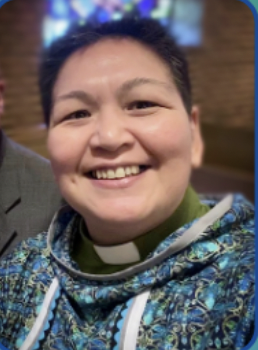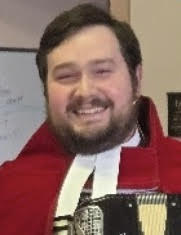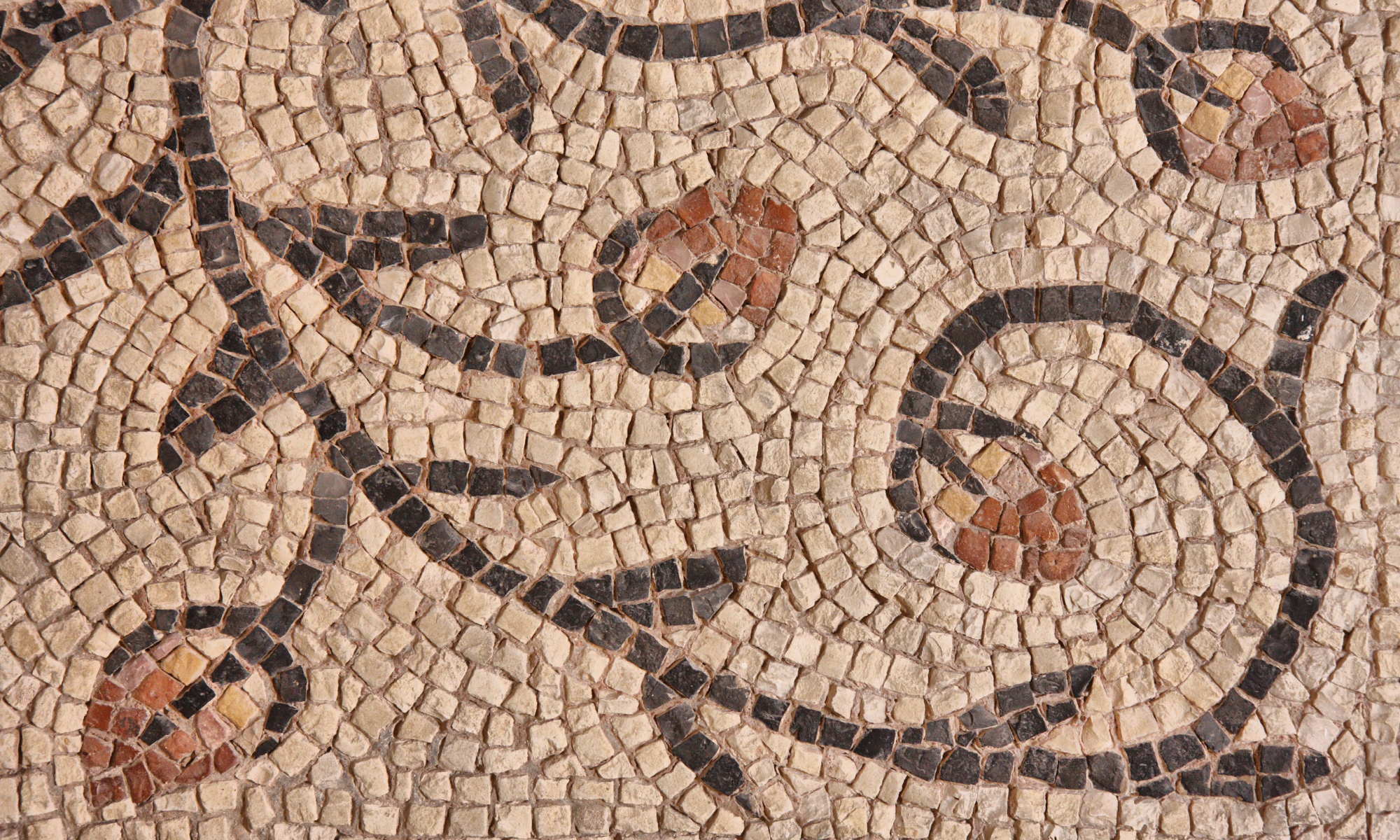As part of this series, we wanted to give Anglicans a chance to hear new voices, particularly on the topic of inclusion and diversity. We are pleased to share this Q&A with Bishop Ann Martha Keenainak, of the Diocese of the Arctic. This conversation took place in April of 2025, in advance of her May 2025 election and consecration. Bishop Alex Pryor (also consecrated in May) joined in on part of the conversation to share another diocesan perspective.
Sharon Dewey Hetke: I’m going to invite you to share some of the things you’ve found difficult or challenging about General Synod, but I also want to hear about positive things about the experience—either way, we want to help make General Synod a more productive, welcoming, and encouraging experience, that brings us closer to God, binds us together, and builds up the Church. So, can you tell me a bit about your background? Were you born and raised in the Arctic?
Ann Martha Keenainak: Yes, I was born in Pangnirtung; I have also spent a bit of time in southern Canada—for my RCMP training, and then later when I went down to Wycliffe College for 4 months.
SDH: When was your first General Synod?
AMK: General Synod in Calgary in 2023 was my first General Synod experience.
SDH: Tell me what that was like for you.
AMK: I didn’t know what to expect—I was amazed by the broad variety of people from across Canada. I was just amazed by how this one body of Christ is. I came in as an alternate, so I didn’t know what to expect, other than to be open. It was challenging for me, being from a smaller community: I had wished that there was more information that could have been presented ahead of time—maybe from our diocesan head office on what the Motions and changes were, what was being presented.
And you know how they had assigned seats—we all introduced ourselves, but I didn’t know who they were. I got to know [one person especially] but when Motions were being presented, I wanted to ask more questions. But I didn’t have the level of having that relationship where you know you can communicate freely and get more of an understanding. And there’s academic understanding and—I don’t know how else to explain this—but Inuit have a different way of understanding from academic. And part of it was feeling they wanted me to make a vote on something I didn’t understand. We had our diocesan and suffragan bishops but it’s such a large, vast place for us to try to share this information. And it just felt like such a fast-paced voting that we had to do.
SDH: Certainly, there could be some good reasons for the assigned seating too—to get people to mix and know each other. But from what I have heard from a number of Indigenous delegates is that it really does make it hard for those that already feel somewhat alienated.
AMK: Another part—it makes me emotional thinking about it. It really made me think about how in the North, it has been colonized. And for it to have to be such a fast-paced, learning, adapting lifestyle and then being separated into different tables…it felt like another form of being colonized. For us to be part of this General Synod, and to have an opportunity to ask questions and try and understand one another—where we can ask our bishops, and we can ask the other members of the group, “I didn’t understand that, I didn’t catch that.” It’s a support system for each other.
SDH: Did you go up to the mic to speak?
AMK: When I had gone up, I spoke in Inuktitut—I introduced myself, where I’m from, who I am, and I shared with them what I was feeling of not understanding what is being presented. I spoke all of that in Inuktitut. Only afterwards did I translate it, and say “The same way that you were not understanding me in my mother tongue is how I’m not understanding what’s being presented and we are supposed to vote on this and it just feels as though it’s so fast-paced.”
SDH: Is that a cultural factor, to an extent? How would that feel different from a decision being made at your diocesan synod, in the Arctic.
AMK: Alex, when we had our diocesan synod, we were all at the same level at the hotel in Yellowknife? That’s how I remember it…
Alex Pryor: That’s right, there’s no high table and everybody is sitting at round tables and has a chance to speak.
SDH: I did hear people comment that a lot of the Resolutions were coming from Church House—even being moved and seconded by church officials—instead of coming from other delegates. So, I think that was a problem for others too, and I’m thinking even more so for people who are used to more of a group or consensus approach to making decisions. Of course, Indigenous cultures are diverse, but I know that some Cree folks would say that—that they’re used to more of a consensus model.
AMK: Now that I’m thinking about it, maybe that’s what was frustrating. Because they were telling us to vote where it was like “It’s already decided—do you agree with it or not?”
AP: I think one of the things that’s different in the way we do our diocesan synods is that when there’s a Resolution coming, before everyone goes to the mic and talks about it, the deaneries, the tables, group you’re sitting with—you discuss it among yourselves. Make sure everybody understands what’s being presented, make sure everybody knows what the implications are, what the outcome is, and then there’s an opportunity for the tables from each deanery or group of parishes to get up and share what came up in their conversation and only then it goes to a debate and the calling of the questions. I don’t know what that would be like in other dioceses, say Mishamikoweesh or others, but we have a more conversational approach to things. Would you agree, Ann Martha?
AMK: I agree with that.
SDH: You did say you were amazed at the body of Christ, and the vastness and diversity from across the country.
AMK: That was a positive part of it, but as we progressed more and more, when we had our liturgy, our services together, it was the changes that were evident of not saying much of Jesus, it didn’t seem like there was much of Holy Spirit being mentioned, but there was “Creator…”. I also observed the strong force of being told to accept beliefs that we believe go against what the Scripture says. And there was the feeling that these ideas are being put forward, but neither do they want us to have a voice to express ourselves. And I know it’s different for people from other places, other Indigenous people, but a part of the other frustration was for me when they read the land acknowledgement. I felt like “Well, what are you going to do about that, now that you’ve read it? What are you doing to support that? What are you doing to put that into action? You do acknowledge it, but it feels as though you’re just putting it on paper so that it looks good.” And I’m tired of Indigenous being all painted with the same brush, when we’re not. We are different cultures—we do have some similarities but we Inuit don’t do burnt offering, we don’t have Sacred Circles, we don’t do feathers—it’s very different.
SDH: I have also heard renewed requests for translation services—obviously, your English is excellent, Ann Martha, but I assume some of your fellow delegates may struggle to follow what’s happening in English.
AMK: I think this round [2023] we were okay…
SDH: Fair enough! Perhaps that’s more of an issue for delegates from other parts of the country.
AP: In some cases it’s not as much a translation, word-for-word issue, but it’s the procedural language. Ann Martha, I remember you coming to me and saying, “I know all of the words they’re saying, but I don’t know what’s going on.” And that’s very understandable.
For me, if I was a new person coming to General Synod from my background, and I hear people throwing around all these technical words, and getting out their copy of Kerr and King and looking up references to procedural things, I might think “Oh wow, these people really know what they’re doing—that’s great.” Where I think for some other people, like many of our Arctic delegates, all of that is kind of an indication to just shut down, because you’re not really part of it.
AMK: That’s what it is.
SDH: So, what can be done differently? There’s still going to be procedure, parliamentary procedure, but I wonder if there’s things that could be done differently? I think it can make people feel excluded, right off the bat. And you’re afraid to stand up and do something that’s “out of order.”
AP: I think also if there were some mechanism in the procedure where someone can just ask for an explanation of the procedure. That might remove some of the barriers—which more people feel than we may realize. I can remember at the last GS, there was a motion and then it was amended and then there was a vote on an amendment to the amendment. I can remember texts simultaneously from three people saying, “What’s going on now?!” And I’m sure it’s not only the Indigenous delegates saying, “We don’t really know what’s happened; how can we really be a part of this?”, but especially for those for whom that is not part of their daily life at all, to have some sort of mechanism.
SDH: It feels like so much is pressed into a day, that people are getting lost.
AMK: It was a lot! But definitely being able to sit together would be a huge support. And as Alex said, being able to get an understanding, with them explaining what’s being done. And an opportunity to discuss instead of everything being so rushed. It says in the Scriptures that we need to pray and discern, and I understand it’s already been presented where we weren’t in the picture, but now they’re asking for our vote and input. The other one that was surprising, was I thought we had voted on one Resolution, but because they didn’t agree with the numbers that was voted, then we had to vote again.
AP: The biggest sense I got from the other delegates from the Arctic, is wishing there was more time to discuss, not just debate. Because once we get into debate mode, it’s very much throwing points back and forth, people getting up with carefully crafted speeches, and then “Call the vote”… But all of the delegates, yes, they’re delegates for their own diocese, but they’re making decisions for the whole church. And we fill the agenda with so many things. I’m sure whoever puts forward the Motion thinks it’s a very important cause, but we’re filling the agenda with statements on politics in the Middle East, when we actually have business relating to our own faith and worship and practice of how we run our churches that needs time to be discussed.
SDH: What would that look like? I’m going to play devil’s advocate here for a second because we’re saying we would like delegates from a certain diocese to be able to sit together but when you say discuss, I assume you’d want to maybe hear from other delegates, not just their own diocese. Or is there a way of having a discussion in a large room, that’s not a debate?
AP: Yes, it’s helpful to sit together with those you’ve come to understand and whom you know. Like in our diocese, we sit together by deanery, generally. But then there might be ten minutes to discuss something at tables, and then a chosen representative from each table can get up and share one thing. So, before you’re actually to the point of really debating or voting on something, you’re hearing the opinions around the room, not just the first person who gets to the mic. This allows for there to be multiple opinions expressed without necessarily weighting them good or bad, pro or con right off the start, the way that debate format does.
SDH: Any last thoughts about preparing for General Synod this June, Alex and Ann Martha?
AP: Something we will do, once we have our delegates elected this year, as soon as the convening circle goes out, we will start preparing ourselves, reading it together where we actually understand what’s on the agenda.
SDH: Ann Martha, you get the last word. If you’re at the next General Synod, how will you prepare or how will it be different?
AMK: Every opportunity is different, to be able to prepare ourselves, and always together in prayer and agreement. It was definitely a learning experience for me.

Ann Martha Keenainak was elected Suffragan Bishop in the Diocese of the Arctic in May 2025.

Alex Pryor was elected Bishop of the Diocese of the Arctic in May 2025.

